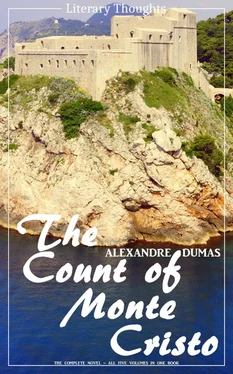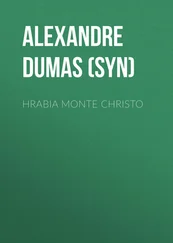His guards, taking him by the arms and coat-collar, forced him to rise, and dragged him towards the steps that lead to the gate of the fortress, while the police officer carrying a musket with fixed bayonet followed behind.
Dantes made no resistance; he was like a man in a dream: he saw soldiers drawn up on the embankment; he knew vaguely that he was ascending a flight of steps; he was conscious that he passed through a door, and that the door closed behind him; but all this indistinctly as through a mist. He did not even see the ocean, that terrible barrier against freedom, which the prisoners look upon with utter despair.
They halted for a minute, during which he strove to collect his thoughts. He looked around; he was in a court surrounded by high walls; he heard the measured tread of sentinels, and as they passed before the light he saw the barrels of their muskets shine.
They waited upwards of ten minutes. Certain Dantes could not escape, the gendarmes released him. They seemed awaiting orders. The orders came.
"Where is the prisoner?" said a voice.
"Here," replied the gendarmes.
"Let him follow me; I will take him to his cell."
"Go!" said the gendarmes, thrusting Dantes forward.
The prisoner followed his guide, who led him into a room almost under ground, whose bare and reeking walls seemed as though impregnated with tears; a lamp placed on a stool illumined the apartment faintly, and showed Dantes the features of his conductor, an under-jailer, ill-clothed, and of sullen appearance.
"Here is your chamber for to-night," said he. "It is late, and the governor is asleep. To-morrow, perhaps, he may change you. In the meantime there is bread, water, and fresh straw; and that is all a prisoner can wish for. Goodnight." And before Dantes could open his mouth – before he had noticed where the jailer placed his bread or the water – before he had glanced towards the corner where the straw was, the jailer disappeared, taking with him the lamp and closing the door, leaving stamped upon the prisoner's mind the dim reflection of the dripping walls of his dungeon.
Dantes was alone in darkness and in silence – cold as the shadows that he felt breathe on his burning forehead. With the first dawn of day the jailer returned, with orders to leave Dantes where he was. He found the prisoner in the same position, as if fixed there, his eyes swollen with weeping. He had passed the night standing, and without sleep. The jailer advanced; Dantes appeared not to perceive him. He touched him on the shoulder. Edmond started.
"Have you not slept?" said the jailer.
"I do not know," replied Dantes. The jailer stared.
"Are you hungry?" continued he.
"I do not know."
"Do you wish for anything?"
"I wish to see the governor." The jailer shrugged his shoulders and left the chamber.
Dantes followed him with his eyes, and stretched forth his hands towards the open door; but the door closed. All his emotion then burst forth; he cast himself on the ground, weeping bitterly, and asking himself what crime he had committed that he was thus punished.
The day passed thus; he scarcely tasted food, but walked round and round the cell like a wild beast in its cage. One thought in particular tormented him: namely, that during his journey hither he had sat so still, whereas he might, a dozen times, have plunged into the sea, and, thanks to his powers of swimming, for which he was famous, have gained the shore, concealed himself until the arrival of a Genoese or Spanish vessel, escaped to Spain or Italy, where Mercedes and his father could have joined him. He had no fears as to how he should live – good seamen are welcome everywhere. He spoke Italian like a Tuscan, and Spanish like a Castilian; he would have been free, and happy with Mercedes and his father, whereas he was now confined in the Chateau d'If, that impregnable fortress, ignorant of the future destiny of his father and Mercedes; and all this because he had trusted to Villefort's promise. The thought was maddening, and Dantes threw himself furiously down on his straw. The next morning at the same hour, the jailer came again.
"Well," said the jailer, "are you more reasonable to-day?" Dantes made no reply.
"Come, cheer up; is there anything that I can do for you?"
"I wish to see the governor."
"I have already told you it was impossible."
"Why so?"
"Because it is against prison rules, and prisoners must not even ask for it."
"What is allowed, then?"
"Better fare, if you pay for it, books, and leave to walk about."
"I do not want books, I am satisfied with my food, and do not care to walk about; but I wish to see the governor."
"If you worry me by repeating the same thing, I will not bring you any more to eat."
"Well, then," said Edmond, "if you do not, I shall die of hunger – that is all."
The jailer saw by his tone he would be happy to die; and as every prisoner is worth ten sous a day to his jailer, he replied in a more subdued tone.
"What you ask is impossible; but if you are very well behaved you will be allowed to walk about, and some day you will meet the governor, and if he chooses to reply, that is his affair."
"But," asked Dantes, "how long shall I have to wait?"
"Ah, a month – six months – a year."
"It is too long a time. I wish to see him at once."
"Ah," said the jailer, "do not always brood over what is impossible, or you will be mad in a fortnight."
"You think so?"
"Yes; we have an instance here; it was by always offering a million of francs to the governor for his liberty that an abbe became mad, who was in this chamber before you."
"How long has he left it?"
"Two years."
"Was he liberated, then?"
"No; he was put in a dungeon."
"Listen!" said Dantes. "I am not an abbe, I am not mad; perhaps I shall be, but at present, unfortunately, I am not. I will make you another offer."
"What is that?"
"I do not offer you a million, because I have it not; but I will give you a hundred crowns if, the first time you go to Marseilles, you will seek out a young girl named Mercedes, at the Catalans, and give her two lines from me."
"If I took them, and were detected, I should lose my place, which is worth two thousand francs a year; so that I should be a great fool to run such a risk for three hundred."
"Well," said Dantes, "mark this; if you refuse at least to tell Mercedes I am here, I will some day hide myself behind the door, and when you enter I will dash out your brains with this stool."
"Threats!" cried the jailer, retreating and putting himself on the defensive; "you are certainly going mad. The abbe began like you, and in three days you will be like him, mad enough to tie up; but, fortunately, there are dungeons here." Dantes whirled the stool round his head.
"All right, all right," said the jailer; "all right, since you will have it so. I will send word to the governor."
"Very well," returned Dantes, dropping the stool and sitting on it as if he were in reality mad. The jailer went out, and returned in an instant with a corporal and four soldiers.
"By the governor's orders," said he, "conduct the prisoner to the tier beneath."
"To the dungeon, then," said the corporal.
"Yes; we must put the madman with the madmen." The soldiers seized Dantes, who followed passively.
He descended fifteen steps, and the door of a dungeon was opened, and he was thrust in. The door closed, and Dantes advanced with outstretched hands until he touched the wall; he then sat down in the corner until his eyes became accustomed to the darkness. The jailer was right; Dantes wanted but little of being utterly mad.
Chapter 9 – The Evening of the Betrothal.
Villefort had, as we have said, hastened back to Madame de Saint-Meran's in the Place du Grand Cours, and on entering the house found that the guests whom he had left at table were taking coffee in the salon. Renee was, with all the rest of the company, anxiously awaiting him, and his entrance was followed by a general exclamation.
Читать дальше












